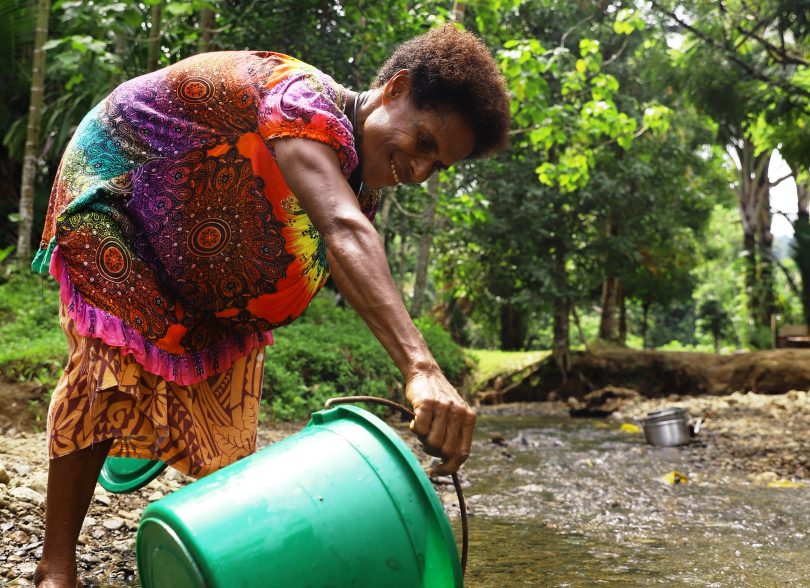New analysis undertaken by WaterAid shows funding to water supply, sanitation and hygiene (WASH) is at its lowest levels since the SDGs began. Focusing on OECD Development Assistance Committee (DAC) donors, in 2021 WASH funding represented only 2.7% of all official development assistance (ODA). This is despite the Global Multidimensional Poverty index concluding that across 111 countries, the greatest causes of deprivation relate to clean water and sanitation.
Since 2018, global ODA to the water supply and sanitation sector has declined by 28%. If current trends continue, it will be over US$2 billion per year lower in real terms in 2023 than the most recent high point in 2018. These reductions in WASH ODA coincide with the triple crises of COVID-19, rising costs of living and climate change – despite WASH being essential to strong health systems, good nutrition, infection prevention and control, economic development and climate change adaptation.
Globally, the lack of ODA funding to water and sanitation is replicated when health funding and climate finance are analysed, with only 0.6% of aid for health having a strong WASH component in 2015-21, and only 0.1% of the world’s annual total climate finance going to basic water, sanitation and hygiene. Yet WASH climate adaptation measures alone require an additional US$83.7 billion funding per year globally.
WaterAid’s analysis shows that Australia consistently provides a lower share of ODA to WASH compared to the average of all other donors (Figure 1). If Australia had provided the same share of ODA as other donors averaged between 2015 and 2021, an additional US$150 million would have been allocated for WASH.

Most of Australia’s ODA financing for water supply and sanitation does not reach the poorest and least developed countries. Only one-fifth of Australia’s WASH ODA between 2015 and 2021 went to least developed countries. Over half of Australia’s country-specific ODA for WASH infrastructure went to 16 countries that are on track to meet their SDG 6 (water and sanitation) targets, and less than 10% went to countries in the Pacific, where coverage of basic water and/or sanitation services is now heading in a negative direction, including in Fiji, Niue, Solomon Islands and Vanuatu.
The Pacific is one of the most off-track regions for meeting the SDG 6 targets for basic drinking water and sanitation. Approximately 70% of the Pacific population lack access to basic sanitation.
A deep dive into the WASH situation in Papua New Guinea, where almost three-quarters of the Pacific Islands population lives, highlights why strategic use of WASH ODA is needed in the Pacific now more than ever, to establish sustainable local financing models. The PNG population practising open defecation has grown from about 750,000 in 2000 to over 1.4 million in 2020. On current trends PNG will miss SDG targets for both water supply and sanitation access.
In 2021 annual spending on WASH in PNG was just US$2.31 per person. Worldwide, almost two-thirds of funding for WASH comes from household expenditure, with most of the remainder from government budgets – but in PNG, household and government spending combined makes up barely one-quarter of reported WASH funding, with the rest coming from donors (mostly loans). Total investment in WASH currently is insufficient to reach everyone, and demands more sustainable financing models based on public and private investment.
While ODA currently plays an oversized role, it should be targeted more strategically to strengthen WASH sector systems and to catalyse more sustainable local investment that can build community resilience to climate change.
With the increasing impacts of climate change affecting WASH services, Pacific Island leaders are acutely aware that dedicated and integrated responses are required to ensure resilience. The Intergovernmental Panel on Climate Change has projected that climate change will cause a 50% reduction in water availability in some Pacific Island countries by 2100. To address climate impacts, nearly 100% of Australia’s WASH ODA is now being repurposed to contribute to Australia’s climate financing commitments. However, to ensure climate-resilient communities, ODA should first be used to strengthen systems and establish sustainable financing models to provide the thousands of currently underserved people in the Pacific with the basic WASH services they need to thrive and build their own resilience. Climate financing should then be used as an additional mechanism to support adaptation efforts including rebuilding after disruptions.
Although scarce, some of Australia’s current investments show how ODA can be used to increase local investment in countries to meet their WASH and climate resilience challenges. Australia’s Water for Women Fund prioritises WASH sector system strengthening, and sets a global benchmark for integrating gender equity, disability and social inclusion, and climate-resilient outcomes into WASH. Through our Water for Women project in Wewak District in PNG, WaterAid has seen firsthand how uniting the local WASH sector behind a shared goal and five-year WASH plan has triggered thousands of PNG kina investment from district, provincial and national government to accelerate WASH service access.
WaterAid’s OECD DAC WASH analysis argues that donors need to reverse the decline in WASH ODA to drive more local investment in future-focused climate resilience. Good practice from Australia’s Water for Women Fund highlights the important role WASH ODA can play in enabling local actors to lead more sustainable services and adapt them for long-term climate resilience. Australia can and should be at the forefront of using WASH ODA strategically, by strengthening WASH systems in the countries that are most off track, and building alliances with development banks and national governments to design sustainable WASH financing models in our region.
With a lack of access to basic WASH services already leaving 70% of the Pacific Islands behind, we owe it to our neighbours to use our ODA strategically to catalyse sustainable WASH service models that can lay a foundation for resilience.
Disclosure
WaterAid Australia and the authors are partly funded through grants provided by the Australian Government’s Department of Foreign Affairs and Trade. The views are those of the authors only.



Leave a Comment